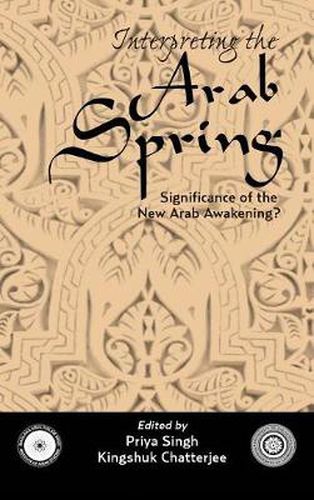Readings Newsletter
Become a Readings Member to make your shopping experience even easier.
Sign in or sign up for free!
You’re not far away from qualifying for FREE standard shipping within Australia
You’ve qualified for FREE standard shipping within Australia
The cart is loading…






This title is printed to order. This book may have been self-published. If so, we cannot guarantee the quality of the content. In the main most books will have gone through the editing process however some may not. We therefore suggest that you be aware of this before ordering this book. If in doubt check either the author or publisher’s details as we are unable to accept any returns unless they are faulty. Please contact us if you have any questions.
The Arab Spring, widely perceived as a momentous event in West Asia, has evoked a persistent flow of interpretation and analysis by academic experts and policy-makers since the upheaval first broke out in December 2010 and the pace of events suggests the flow of analysis on this issue will continue. Like all great social upheavals, the Arab Spring was long-drawn-out in its realisation and born of many factors that are intertwined. It could have occurred any time during the course of the last two or three decades but each passing year brought to the forefront new developments that made it that much more imminent. Economic problems, social problems, political problems, juridical problems and diplomatic problems combined to contribute to an uncompromising sense of grievance across the Arab world that ultimately manifested itself in the Arab spring and winter of 2011. This volume comes out of a conference organised by the Maulana Abul Kalam Azad Institute of Asian Studies, in collaboration with Institute of Foreign Policy Studies and Centre of Pakistan and West Asian Studies, in which an attempt was made to discuss these issues threadbare.
$9.00 standard shipping within Australia
FREE standard shipping within Australia for orders over $100.00
Express & International shipping calculated at checkout
This title is printed to order. This book may have been self-published. If so, we cannot guarantee the quality of the content. In the main most books will have gone through the editing process however some may not. We therefore suggest that you be aware of this before ordering this book. If in doubt check either the author or publisher’s details as we are unable to accept any returns unless they are faulty. Please contact us if you have any questions.
The Arab Spring, widely perceived as a momentous event in West Asia, has evoked a persistent flow of interpretation and analysis by academic experts and policy-makers since the upheaval first broke out in December 2010 and the pace of events suggests the flow of analysis on this issue will continue. Like all great social upheavals, the Arab Spring was long-drawn-out in its realisation and born of many factors that are intertwined. It could have occurred any time during the course of the last two or three decades but each passing year brought to the forefront new developments that made it that much more imminent. Economic problems, social problems, political problems, juridical problems and diplomatic problems combined to contribute to an uncompromising sense of grievance across the Arab world that ultimately manifested itself in the Arab spring and winter of 2011. This volume comes out of a conference organised by the Maulana Abul Kalam Azad Institute of Asian Studies, in collaboration with Institute of Foreign Policy Studies and Centre of Pakistan and West Asian Studies, in which an attempt was made to discuss these issues threadbare.